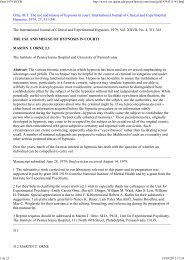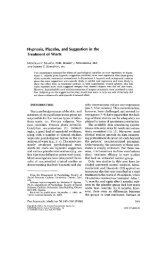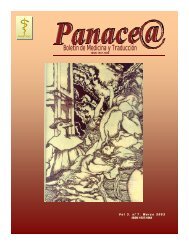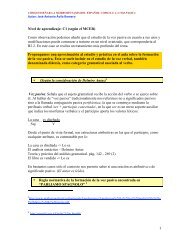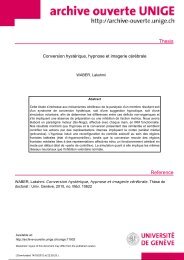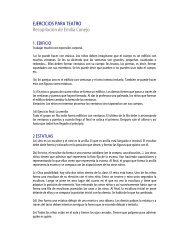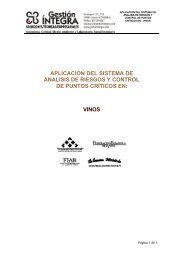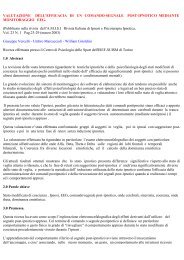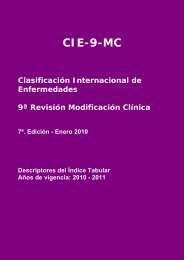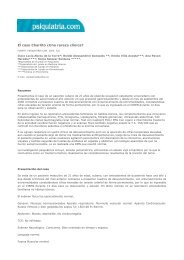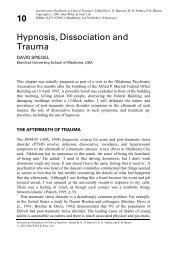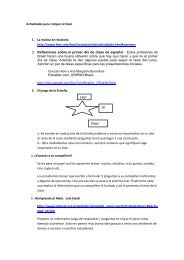Diccionario etimológico comparado de la lengua castellana
Diccionario etimológico comparado de la lengua castellana
Diccionario etimológico comparado de la lengua castellana
You also want an ePaper? Increase the reach of your titles
YUMPU automatically turns print PDFs into web optimized ePapers that Google loves.
—<br />
254Ó FATIN FALÁÑ<br />
Faj-ina. f.<br />
:<br />
Gfr. elini. hacina = fagina y fajo.<br />
Suf. -ina.<br />
SIGN.— 1. Conjunto <strong>de</strong> haces <strong>de</strong> mies que<br />
se pone en <strong>la</strong>s eras.<br />
2. Leña ligera para encen<strong>de</strong>r.<br />
3.<br />
4.<br />
Toque <strong>de</strong> guerra.<br />
Fort. Haz <strong>de</strong> ramas <strong>de</strong>lgadas muy apretadas,<br />
<strong>de</strong> que se sirven los ingenieros militares<br />
para diversos usot!, y muy seña<strong>la</strong>damente para<br />
revestimientos. Las hay <strong>de</strong> revestir, <strong>de</strong> coronar,<br />
incendiarias, etc.<br />
Hizo Autzol fundar en el agua como Isleta, hecha <strong>de</strong><br />
fagina y tierra y muchos materiales. Acost. Hist. Ind.<br />
lib. 7, cap. IH.<br />
5. METRR FAJINA, fr. fig. y fam.<br />
mucho inútilmente, metiendo bul<strong>la</strong><br />
Hab<strong>la</strong>r<br />
y mezc<strong>la</strong>ndo<br />
cosas impertinentes.<br />
Fa-j-ina. f.<br />
Gfr. etim. fa-ena.<br />
SIGN.- faena.<br />
Fajin-ada. f.<br />
Gfr. etim. fajina. Suf. -ada.<br />
SIGN. í. Conjunto <strong>de</strong> fajinas.<br />
2. Obra hecha con el<strong>la</strong>s.<br />
Fajo. m.<br />
Gfr. etim. haz, 1°.<br />
SIGN.—L Haz ó atado.<br />
2. pl. Conjunto <strong>de</strong> ropa y paños con que<br />
se visten los niños recién nacidos:<br />
Le hizo y <strong>la</strong>bró los faros y mantil<strong>la</strong>s, en que se envolvió<br />
y crió. M. Agred. tom. 2, núm. 233.<br />
Faj-6n. m.<br />
Gfr. etim. faja. Suf. -ón.<br />
SIGN.—aum. <strong>de</strong> faja.<br />
Faj-ue<strong>la</strong>. f.<br />
Gfr. etim. faja. Suf. -ue<strong>la</strong>.<br />
SIGN.— d. <strong>de</strong> faja.<br />
Fa<strong>la</strong>ce. adj.<br />
Gfr. etim. fa<strong>la</strong>z.<br />
SIGN.—ant. fa<strong>la</strong>z.<br />
Fa<strong>la</strong>c-ia. f.<br />
Gfr. etim. fa<strong>la</strong>z. Suf. -ia.<br />
SIGN.—L Engaño, frau<strong>de</strong> ó mentira con<br />
que se intenta dañar á otro:<br />
Informándolos fabulosamente, con fa<strong>la</strong>cia y dolo.<br />
il. Agred. tom. 1, núm. 2.<br />
2. Hábito <strong>de</strong> emplear falseda<strong>de</strong>s en daño<br />
ajeno.<br />
Fa<strong>la</strong>ga-dor, dora. m. y f.<br />
Gfr. etim. fa<strong>la</strong>gar. Suf. -dor.<br />
SIGN.— ant. Persona que ha<strong>la</strong>ga.<br />
Fa<strong>la</strong>gar. a.<br />
Gfr. etim. ha<strong>la</strong>gar.<br />
SIGN.—L ant. ha<strong>la</strong>gar.<br />
2. ant. Apaciguar, amortiguar. Usáb. t. c. r.<br />
3. r. ant. alegrarse.<br />
Fa<strong>la</strong>go. 111.<br />
Gfr. etim. ha<strong>la</strong>go.<br />
SIGN.— ant. ha<strong>la</strong>go.<br />
—<br />
Fa<strong>la</strong>güeña-mente. adv. m.<br />
Gfr. etim. fa<strong>la</strong>güeño. Suf. mente.<br />
SIGN.—ant. Ha<strong>la</strong>güeñamente.<br />
Fa<strong>la</strong>gü-eño, eña. adj.<br />
Cfr. etim. ha<strong>la</strong>güeño.<br />
SIGN. -ant. Ha<strong>la</strong>güeño.<br />
Fa<strong>la</strong>gü-ero, era. adj,<br />
Gfr. etim. fa<strong>la</strong>go. Suf. -ero.<br />
SIGN .— Fa<strong>la</strong>güeño:<br />
Todas Jas razones movidas por <strong>la</strong> sabiduría... 8on<br />
pa<strong>la</strong>bras mui dulces é fa<strong>la</strong>gueraa . Men. Cor. Gopl. 40.<br />
Fal-ange. f.<br />
ETIM.— Del <strong>la</strong>t. phai-anx., -angis, fa<strong>la</strong>nge,<br />
cuerpo <strong>de</strong> infantería entre los<br />
griegos; trascripción <strong>de</strong>l griego '^áX-ay^,<br />
-a^yo;, fa<strong>la</strong>nge entre los griegos, legión<br />
en Roma; el cual se compone <strong>de</strong> ¡pa-X-,<br />
abreviación <strong>de</strong> 'fá-Xvj-?, bril<strong>la</strong>nte ; cuyo<br />
raíz 'fa- cfr. en fa-ma, y -ay?, <strong>de</strong> áyxwv,<br />
-(ovcs, todo objeto curvo, codo, brazo,<br />
articu<strong>la</strong>ción, cui-vatura, ángulo, etc.,<br />
cuya raíz áyy.- y sus aplicaciones cfr. en<br />
ANCO. Etimológ. significa <strong>de</strong> braj^os bril<strong>la</strong>ntes,<br />
que bril<strong>la</strong> por <strong>la</strong> mitad <strong>de</strong>l<br />
cuerpo, á <strong>la</strong> altura <strong>de</strong> los bra:3os. Díjose<br />
así por el brillo <strong>de</strong> <strong>la</strong>s fi<strong>la</strong>s <strong>de</strong><br />
<strong>la</strong>ngas que aparecían como una mural<strong>la</strong><br />
<strong>de</strong> hierro, en <strong>la</strong> mitad <strong>de</strong>l cuerpo <strong>de</strong> los<br />
soldados <strong>de</strong> infantería. De pha<strong>la</strong>nx<br />
<strong>de</strong>scien<strong>de</strong> pha<strong>la</strong>ng-ium, <strong>la</strong> tarántu<strong>la</strong>,<br />
especie <strong>de</strong> araña venenosa ( = aranea<br />
tarántu<strong>la</strong>., Lin.) y <strong>la</strong> yerba fa<strong>la</strong>ngites que<br />
cura <strong>la</strong>s mor<strong>de</strong>duras <strong>de</strong> esta araña;<br />
correspondiente al griego 'faX-áyyiov, -ov,<br />
que tiene el mismo significado. Díjose<br />
así por <strong>la</strong> fuerza <strong>de</strong> sus patas, articu<strong>la</strong>ciones,<br />
curvatura <strong>de</strong> <strong>la</strong>s patas, etc.;<br />
como por <strong>la</strong> misma curvatura dióse el<br />
nombre <strong>de</strong> fa<strong>la</strong>nge á los huesos <strong>de</strong><br />
los <strong>de</strong>dos que se cu/ van, se dob<strong>la</strong>n, que<br />
están articu<strong>la</strong>dos. De pha<strong>la</strong>ngium <strong>de</strong>scien<strong>de</strong>n<br />
fa<strong>la</strong>ngía y fa<strong>la</strong>ngio y <strong>de</strong> éste<br />
fa<strong>la</strong>ngi-ano. De pha<strong>la</strong>nx <strong>de</strong>scien<strong>de</strong><br />
FALANS-TERio {=^üivienda <strong>de</strong> <strong>la</strong>s fa<strong>la</strong>nges).<br />
Le correspon<strong>de</strong>n: \<strong>la</strong>\. fa<strong>la</strong>nge,<br />
fa<strong>la</strong>nsterio ; fi-anc. pha<strong>la</strong>nge, pha<strong>la</strong>nstére;<br />
port. pha<strong>la</strong>nge: ingl. pha<strong>la</strong>nx,<br />
pha<strong>la</strong>nstery, etc. Gfr. ano, solemne, etc.<br />
SIGN. í. Cuerpo <strong>de</strong> iiif.mteria pesadamente<br />
armada, que formaba l;i principal fuerza <strong>de</strong><br />
los ejércitos <strong>de</strong> <strong>la</strong> Grecia. Alejandro el Gran<strong>de</strong><br />
lo aumentó y perfeccionó; su or<strong>de</strong>n <strong>de</strong> batal<strong>la</strong><br />
era diez y seis <strong>de</strong> fondo ; su número, diez y<br />
sies mil infantes :<br />
Por tí conquista el Macedón phnlnnge Las <strong>de</strong>scuida'<br />
das márgenes <strong>de</strong>l Indo, Y <strong>la</strong>s que Uu pacíficas el Gange.<br />
ViUeg. Erot. Eleg 12.<br />
2. Cualquier cuerpo <strong>de</strong> tropas numeroso.<br />
I



